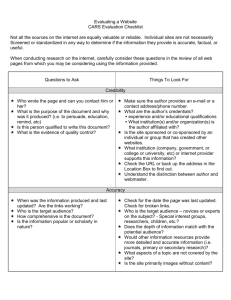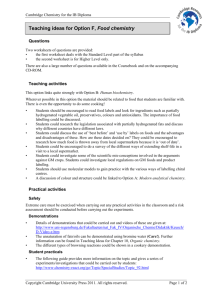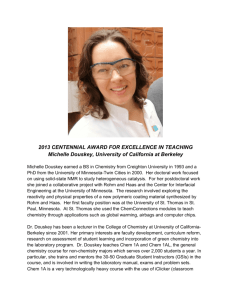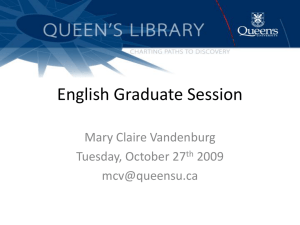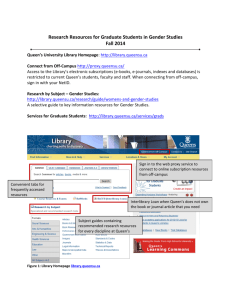CHEM 323 - Queen's University
advertisement
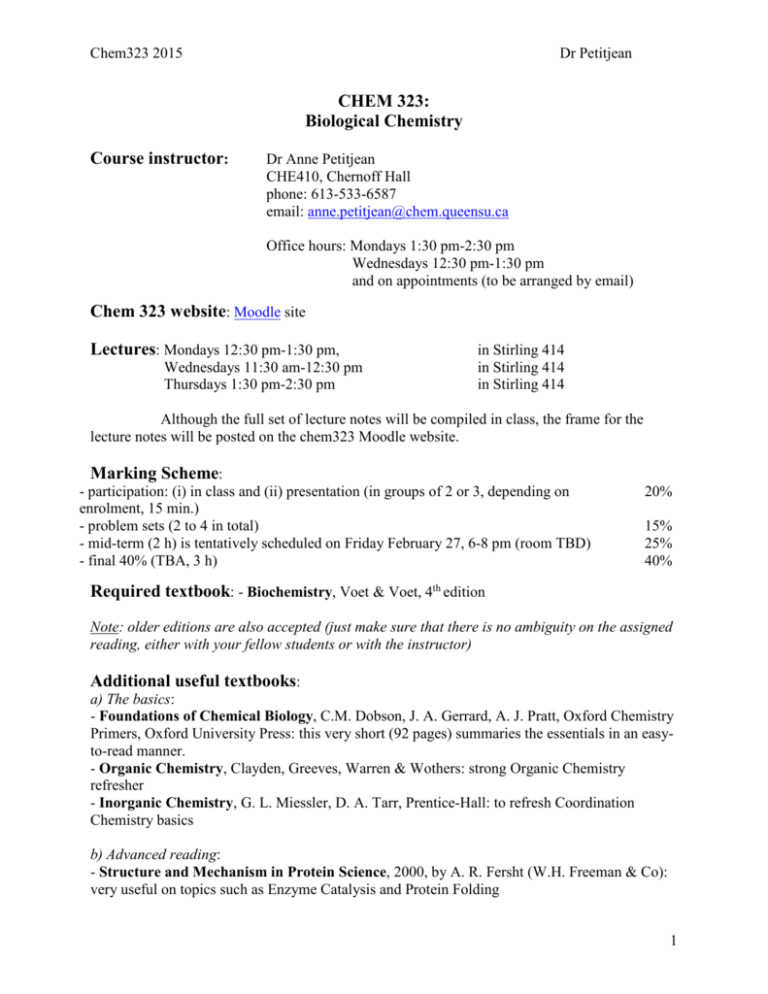
Chem323 2015 Dr Petitjean CHEM 323: Biological Chemistry Course instructor: Dr Anne Petitjean CHE410, Chernoff Hall phone: 613-533-6587 email: anne.petitjean@chem.queensu.ca Office hours: Mondays 1:30 pm-2:30 pm Wednesdays 12:30 pm-1:30 pm and on appointments (to be arranged by email) Chem 323 website: Moodle site Lectures: Mondays 12:30 pm-1:30 pm, Wednesdays 11:30 am-12:30 pm Thursdays 1:30 pm-2:30 pm in Stirling 414 in Stirling 414 in Stirling 414 Although the full set of lecture notes will be compiled in class, the frame for the lecture notes will be posted on the chem323 Moodle website. Marking Scheme: - participation: (i) in class and (ii) presentation (in groups of 2 or 3, depending on enrolment, 15 min.) - problem sets (2 to 4 in total) - mid-term (2 h) is tentatively scheduled on Friday February 27, 6-8 pm (room TBD) - final 40% (TBA, 3 h) 20% 15% 25% 40% Required textbook: - Biochemistry, Voet & Voet, 4th edition Note: older editions are also accepted (just make sure that there is no ambiguity on the assigned reading, either with your fellow students or with the instructor) Additional useful textbooks: a) The basics: - Foundations of Chemical Biology, C.M. Dobson, J. A. Gerrard, A. J. Pratt, Oxford Chemistry Primers, Oxford University Press: this very short (92 pages) summaries the essentials in an easyto-read manner. - Organic Chemistry, Clayden, Greeves, Warren & Wothers: strong Organic Chemistry refresher - Inorganic Chemistry, G. L. Miessler, D. A. Tarr, Prentice-Hall: to refresh Coordination Chemistry basics b) Advanced reading: - Structure and Mechanism in Protein Science, 2000, by A. R. Fersht (W.H. Freeman & Co): very useful on topics such as Enzyme Catalysis and Protein Folding 1 Chem323 2015 Dr Petitjean - Proteins: Structures and Molecular Properties, 2nd edition, by T. E. Creighton (W.H. Freeman & Co): useful on the topic of Protein Folding. Useful websites: a) To read more: Encyclopedia of Biological Chemistry: http://www.sciencedirect.com/science/referenceworks/9780124437104 A collection of short review articles written by experts. A wonderful complement to the textbook! b) For research: - National Center for Biotechnology Information (NCBI): http://www.ncbi.nlm.nih.gov/ for journal articles, protein sequences, DNA sequences, align protein sequences (BLAST), find protein structures and lots more - ExPASY Proteomics Server (also known as Swiss-Prot): http://ca.expasy.org/ This an annotated database dedicated to proteins, which also contains lots of useful online tools for protein sequence and structure analysis. A user-friendly protein structure viewer is available for download as well (http://ca.expasy.org/spdbv/). - Protein Data Bank: http://www.pdb.org/pdb/home/home.do This is where structures of proteins or nucleic acids, determined by X-ray or NMR, are deposited. You can search for a biomolecule then download the file to your own PC for viewing on PyMOL or Swiss-PDBView - Nucleic Acids Database: http://ndbserver.rutgers.edu/ More sources of nucleic acids structures (X-ray or NMR). Advanced searches are possible. Download the file to your own computer and view with free software. Useful software: Download one (or both) of the following FREE programs for viewing and analyzing 3dimensional structures of biomolecules: PyMol: http://www.pymol.org/ Swiss PDB-Viewer: http://ca.expasy.org/spdbv/ IMPORTANT: 1) the lecture material is composed of the LECTURE NOTES; they take priority over the book. In the exams, you will be judged on your understanding of the lecture notes. 2) The specific readings recommended in the lectures, lecture notes and/or syllabus are added to the materials you are responsible for. Finally, some administrative information: 1) If you are unable to write a scheduled exam (mid-term(s) and/or final examinations), please make sure to submit a form of ‘extenuating circumstances’ which may be found at: http://www.chem.queensu.ca/UG/Missed_Exam_Policy.asp 2) Please be reminded of Queen’s policies regarding academic integrity: Academic integrity is constituted by the five core fundamental values of honesty, trust, fairness, respect and responsibility (see www.academicintegrity.org). These values are central to the building, nurturing and sustaining of an academic community in which all members of the community will thrive. Adherence to the values expressed through academic integrity forms a foundation for the "freedom of inquiry and exchange of ideas" essential to the intellectual life of 2 Chem323 2015 Dr Petitjean the University (see the Senate Report on Principles and Priorities http://www.queensu.ca/secretariat/policies/senateandtrustees/principlespriorities.html). Students are responsible for familiarizing themselves with the regulations concerning academic integrity and for ensuring that their assignments conform to the principles of academic integrity. Information on academic integrity is available in the Arts and Science Calendar (see Academic Regulation 1 http://www.queensu.ca/artsci/academic-calendars/2011-2012-calendar/academicregulations/regulation-1), on the Arts and Science website (see http://www.queensu.ca/artsci/academics/undergraduate/academic-integrity), and from the instructor of this course. Departures from academic integrity include plagiarism, use of unauthorized materials, facilitation, forgery and falsification, and are antithetical to the development of an academic community at Queen's. Given the seriousness of these matters, actions which contravene the regulation on academic integrity carry sanctions that can range from a warning or the loss of grades on an assignment to the failure of a course to a requirement to withdraw from the university. 3) Please be also reminded of Queen’s policies regarding disability accommodations: Queen's University is committed to achieving full accessibility for persons with disabilities. Part of this commitment includes arranging academic accommodations for students with disabilities to ensure they have an equitable opportunity to participate in all of their academic activities. If you are a student with a disability and think you may need accommodations, you are strongly encouraged to contact the Disability Services Office (DSO) and register as early as possible. For more information, including important deadlines, please visit the DSO website at: http://www.queensu.ca/hcds/ds/ 3
